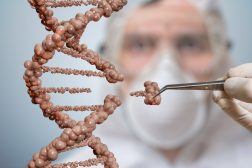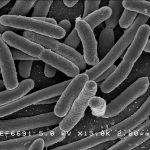Definition
noun, plural: streptococci
(1) A genus of bacteria characterized by being coccus, Gram-positive, and occurring in chains of varying length, and includes bacterial strains responsible for numerous infections such as scarlet fever, tonsillitis, erysipelas, endocarditis, rheumatic fever, glomerulonephritis, impetigo, pneumonia, meningitis, pharyngitis, lymphadenitis and wound infections
(2) Any from the genus of Streptococcus, and collectively referred to as streptococci
Supplement
Streptococcus (also called as strep) is a genus of bacteria that are gram-positive cocci, often occurring in chains of varying length. It belongs to the family Streptococcaceae of the order Lactobacillales (lactic acid bacteria). The name was coined by Albert Theodor Billroth (a Vinennese surgeon) based on the apparent twisting or bending (Greek, streptos) of the streptococcal chain. Many of them are facultative anaerobes and most of them are oxidase-negative and catalase-negative. Some pathogenic species produce exotoxins. In man, streptococcal species are responsible for numerous infections such as scarlet fever, tonsillitis, erysipelas (skin infection), endocarditis, rheumatic fever, glomerulonephritis, impetigo, pneumonia, meningitis, pharyngitis, lymphadenitis, and wound infections. Some of them have anti-phagocytic components: hyaluronic acid-rich capsule, m protein, toxins (e.g. streptolysin O, streptolysin S, erythrogenic toxin), and enzymes streptokinase, streptodornase, hyaluronidase and proteinase.
Streptococci may be classified as alpha-hemolytic, beta-hemolytic, and gamma-hemolytic based on their hemolytic features. Alpha-hemolytic streptococci (e.g. S. pneumoniae and S. viridans) are those that can oxidize iron in the hemoglobin of red blood cells. They appear greenish in color in blood agar as they convert hemoglobin to biliverdin. These bacteria causes incomplete hemolysis (also called alpha-hemolysis) as the red blood cell host remains intact. Beta-hemolytic streptococci are those that can completely lyse red blood cells. Streptococcus pyogenes, for example, will produce a broad zone of almost complete haemolysis on blood agar as a result of streptolysin O and S release. Gamma-hemolytic streptococci are those that do not cause hemolysis.
Beta-hemolytic streptococci may be further grouped according to Lancefield grouping (a serotype classification), i.e. from groups A to V (but not including I and J). The group A strep and group B strep are medically important as they are the causative agents to many strep diseases in man.
Scientific classification:
- Domain: Bacteria
- Phylum: Firmicutes
- Class: Bacilli
- Order: Lactobacillales
- Family: Streptococcaceae
- Genus: Streptococcus Rosenbach, 1884
See also:
Related term(s):
- Group B streptococcus
- Streptococcus acidominimus
- Streptococcus agalactiae
- Streptococcus faecalis
- Streptococcus mitis
- Streptococcus mutans
- Streptococcus oralis
- Streptococcus pneumoniae
- Streptococcus pyogenes
- Streptococcus salivarius
- Streptococcus thermophilus
Related form(s):







